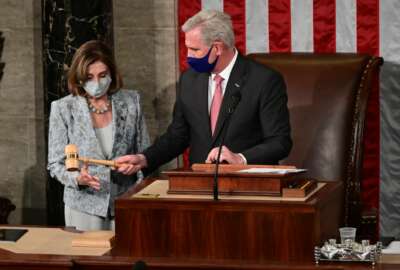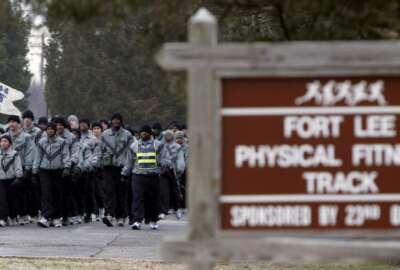
CIA unveils new website to step up recruitment efforts
In today's Federal Newscast, the CIA adds another piece to its two-plus year effort to change the way its recruits the next generation of employees.
To listen to the Federal Newscast on your phone or mobile device, subscribe in PodcastOne or Apple Podcasts. The best listening experience on desktop can be found using Chrome, Firefox or Safari.
- The CIA added another piece to its two-plus-year effort to change the way it recruits the next generation of employees. “A career like no other” — that’s the new tag line from the CIA in an effort to charge up its recruiting efforts. The spy agency revamped its website with a focus on hiring new employees. The new site lets users search open CIA jobs, learn about student programs and describes the agency’s hiring process. The new website is the latest in a series of efforts started in September 2018 by director Gina Haspel. Among the other initiatives the CIA has launched are a CIA Labs office focused on research and development and naming its first executive for Hispanic engagement in October.
- A bipartisan bill which requires the government to identify who owns the office space it leases is signed into law. The Secure Federal Leases from Espionage and Suspicious Entanglements Act was first brought forth by Sens. Gary Peters and Rob Portman. It was in response to a Government Accountability Office report which found several federal agencies were leasing high-security office space in foreign-owned properties, including six FBI and three Drug Enforcement Administration field offices.
- The 117th Congress has a few new notable rules aimed at improving diversity and inclusion. The House passed a new rules package that makes its own diversity and inclusion and whistleblower ombudsman offices permanent. Lawmakers established both offices in the last Congress. The rules also require congressional committees to plan out how they’ll address racial, gender and other inequities through their hearings and other work. House members passed the new rules package along party lines.
- Several hundred members of the D.C. National Guard are being activated this week to help manage the protests expected during this week’s formal counting of the Electoral College vote. Defense officials said Army Secretary Ryan McCarthy has approved the call-up of 340 troops starting today. The soldiers will be unarmed, and will work mainly on traffic and crowd control duties. (Federal News Network)
- The military is seeing more COVID-19 cases as positive tests continue to rise across the country. More than 110,000 service members have now been infected with coronavirus, according to new numbers from the Defense Department. The military is seeing cases rise faster in recent weeks. About 50,000 service members have been infected from Thanksgiving to the New Year. The number of people related to DoD who have been infected is nearing 170,000. That includes contractors and military dependents. Fourteen service members have died from the disease. DoD attributes the relatively low mortality rate to a young and fit population.
- It’ll be several more years before the Pentagon passes a financial audit. But now Congress wants to know how much DoD is spending on the process itself. DoD has only done three full-scale audits so far. As expected, it’s failed each one. But a provision in the just-passed 2021 federal spending bill orders the department to start providing detailed breakdowns on how much those audits cost. Congress wants reporting on eight different elements, including how much DoD is paying outside accounting firms and how much it’s spending to solve the problems auditors identify. The Pentagon has previously estimated those costs at about $1 billion a year. (Federal News Network)
- The Air Force Life Cycle Management Center’s Simulator’s Division hosted its second annual pitch day, which allows small and nontraditional defense companies to throw out ideas to the Air Force in hopes of getting a small business innovative research contract. The division awarded $10 million to 10 small businesses. The awardees included CORVID Technologies, which wants to provides virtual training simulations for refueling planes, and Soar Technologies, which creates speech recognition software for flight simulators.
- The General Services Administration is trying to get a sense of just how mature the artificial intelligence and machine learning sector is among current and potential contractors. GSA released a request for information for hardware and services vendors seeking in-depth details on the state of AI and machine learning. The 41-page document asks everything from agencies currently using the product or service to the amount of training needed to use the technology, to the data security integrated in the products. Reponses to the survey are due Jan. 29.
- For one federal agency, a year of the pandemic made things both easier and more difficult. The number of passengers passing through Transportation Security Administration checkpoints fell by nearly two-thirds last year. TSA said it checked 324 million passengers, compared to 824 million the year before. But Administrator David Pekoske said the agency had to make numerous changes to protect it’s own officers and the public from COVID-19. Officers are still under orders to wear face masks and gloves. TSA installed plastic barriers at nearly 400 airports, but it also installed devices that let travelers scan their own documents for verification, rather than hand them over to an officer; those went up at 125 airports.
- More federal unions are calling on Social Security Commissioner Andrew Saul to resign. National leadership at the American Federation of Government Employees and the International Federation of Professional and Technical Engineers said the SSA commissioner should resign, and that SSA leaders haven’t communicated a clear vision for the agency or a long-term reopening and telework plan. The AFGE union representing SSA customer service representatives and the Association of Administrative Law Judges have previously called for the commissioner’s resignation. Saul is in the middle of a six-year term that expires in 2025.
- The Postal Regulatory Commission named commissioner Ashley Poling as its vice chairwoman. She’ll take over for former PRC vice chairman Michael Kubayanda, who’s served out his one-year leadership term. Prior to joining the PRC, Poling served as the director of governmental affairs to Senate Homeland Security and Governmental Affairs Committee ranking member Gary Peters (D-Mich.). She also served as senior policy counsel to former Sen. Heidi Heitkamp (D-N.D.) and as counsel to Sen. Jon Tester (D-Mont.).
- The federal Chief Data Officers Council welcomed its newest member. The State Department named former DHS executive Matthew Graviss as its first permanent chief data officer. He’ll take over for acting CDO Janice deGarmo, who’s held the job since the summer 2019. Graviss previously served as the chief data officer at Citizenship and Immigration Services and as the Transportation Security Administration’s director of security threat assessment operations. The 2019 Foundations for Evidence-Based Policymaking Act requires agencies to name a chief data officer.
Copyright © 2025 Federal News Network. All rights reserved. This website is not intended for users located within the European Economic Area.
Eric White
Eric White is news anchor and Federal Drive producer at Federal News Network.
Follow @FEDERALNEWSCAST
Related Stories
Related Topics
2020 election
administrative law judges
airport security
All News
Andrew Saul
Ashley Poling
Chief Data Officers Council
CIA
Covid-19
diversity equity inclusion and accessibility
Electoral College
Federal Drive
Federal Newscast
General Services Administration
Gina Haspel
Hiring/Retention
human capital
Inclusion
National Guard
Postal Regulatory Commission
recruitment
Social Security Administration
State Department
Technology
Tom Temin
Transportation Security Administration
Workforce





